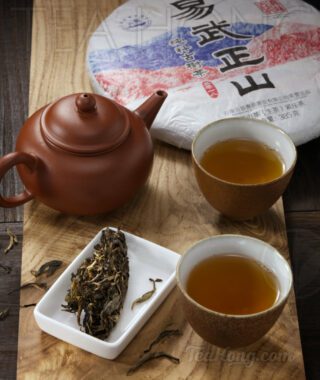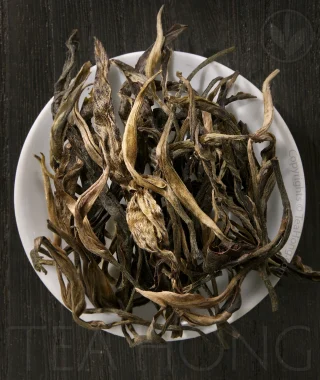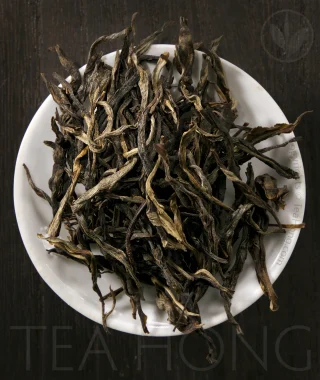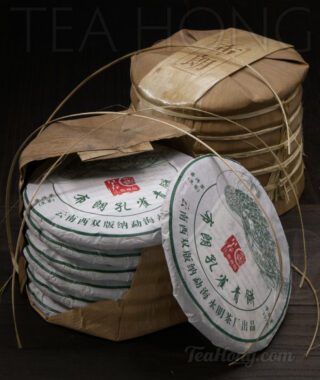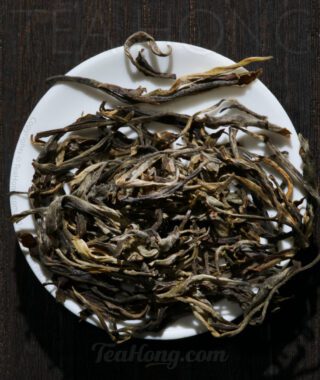-

Yiwu Zheng Shan 2018, Aged Pu’er shengcha cha bing
Compressed tea, Cool Energy, Fuller Bodies, Lighter Aromas, Pu'er teas, Stronger Tastes, Tea, Yunnan$ 130.00 – $ 810.00Huimin authentic old tree series: Mount Yiwu proper
This aged Yiwu may present itself a little softer in the start, but its energy lingers and grows, alive beyond the taste faculty. Yiwu maybe known as one of the softest in the shengcha category, yet properly infused, it can actually be quite powerful. Originated in the deep mountain ranges along the border with Laos, where the weather can be as unpredictable as the wild life one may encounter, the biochemistry of the leaves is as lively and interesting to learn. There are people who prefer this tea quite fresh, but in our opinion it is better aged for a few years. This tea is also available in a small portion as a part of Tea Taster's Box: Shengcha Pu'er Cha Bings.


 Net weight per discus: 357 g (12.6 oz)
Please choose if you'd like a single discus or the whole stack:
Net weight per discus: 357 g (12.6 oz)
Please choose if you'd like a single discus or the whole stack: -

Moss Island 2018, shengcha Pu’er maocha
Cold Energy, Fuller Bodies, Home, Pu'er loose leaf shengcha, Pu'er teas, Stronger Tastes, Tea, Yunnan$ 21.30Bing Dao Maocha
Leaves from Bing Dao look definitively different as from, say, those of Pasha. It is a different variety of Yunnan Da Ye tea tree1 — Mengku Da Ye (Mengku Big Leaf), that differentiates itself not only with the larger leaf size, but also an accent of crispy sweetness. It is believed that Bing Dao — Island of Moss2 — is the birthplace of the tea tree variety. Variants and cultivars of Mengku Da Ye are used popularly in the county of Mengku3 for both black and pu'er tea production. Some say it began in late 15th century when a governor asked locals to plant 200 seeds here to start tea production. That would become the tens of thousand in this area where the Mengku variety is found to be genetically the most pure. Less than 20% of variation in their DNA, quite impressive for over 500 years of unmanaged sexual propagation in the wild. I think this batch is exceptional in manifesting the characteristics of this unique tea tree. It is a premium harvest. If you are interested, compare this loose leaf form with the compressed form » Bing Dao 2014 that is also available at Tea Hong.
Net weight: 40 g (1.4 oz) in wide Kraft-alu pack




-

Pasha Old Tree 2017, shengcha Pu’er maocha
Cold Energy, Floral Aromas, Fuller Bodies, Home, Pu'er loose leaf shengcha, Pu'er teas, Tea, Yunnan$ 25.70Maocha from Wild Old Trees
Of all the sub-regions in Yunnan, Pasha is my personal favourite for shengcha. Its yields are typically more floral, rounder and sweeter yet still carrying the terra’s characters of a little punch. We have included also a cha bing (Pasha 2013) in our Pu’er offering in addition to this premium harvest loose leaf maocha. Although both are produced with top picks from this same area, the two different forms deliver different, yet somehow related taste profiles. The pure, gentle, direct and honest rawness of the loose leaf is a different kind of enjoyment from the transformed taste characteristics of the compressed form. Similar leaves, two teas. Compare them to find out which one you like better. It may tell a thing or two about yourself. We have matured the loose leaf for 7 years before making it available for a better representation of the true Pasha quality.
Net weight: 40 g (1.4 oz) in wide Kraft-alu pack




-

Bulang Peacock 2018, aged Pu’er shengcha cha bing
Compressed tea, Cool Energy, Fuller Bodies, Pu'er teas, Stronger Tastes, Tea, Yunnan$ 39.00 – $ 238.00A Xishuangbanna classic
Some believe that tea originated in an area bordering Yunnan, Laos and Myanmar. Bulang Mountain lies in the middle of that within the province of Yunnan on the southern tip of an area called Xishuangbanna. Shengcha from this area is rich with flavours and not overtly strong. We have picked a good value production as an optional entry point for exploring this category of tea. Southern Yunnan is also home to the peacock, the beautiful bird that the indigenous tribes love as a symbol of grace and peace. A good tea is exactly that.


 Net weight per discus: 357 g (12.6 oz)
Please choose if you'd like a single discus or the whole stack:
Net weight per discus: 357 g (12.6 oz)
Please choose if you'd like a single discus or the whole stack: -

Western Half of the Mountain, shengcha Pu’er maocha
Cold Energy, Floral Aromas, Pu'er loose leaf shengcha, Pu'er teas, Stronger Tastes, Tea, Yunnan$ 16.90Mengku Maocha 2015 — Mengku Xi Ban Shan
Rough terrains, with altitudes ranging from 1000’s to over 3000 m make up almost 100% of the total 475 km2 of Mengku, in the subregion of Lincang in Yunnan. The uneven landscape is interlaced with huge rocks and subtropical forests. That may explain why for over 500 years the production of tea has been a major means of livelihood for the indigenous tribes here. Old tea trees exist in patches here and there. Sometimes there is a single huge one which immediate surrounding would be cleared for pickers to work during harvests. While leaves from the east side of this cluster of mountains are known for their strong character, those produced on the west side are sweeter, silkier and more gentle. I think the latter is better in the form of maocha. We have matured this batch for 9 years for your better enjoyment, and friendlier to the stomach.
Net weight: 40 g (1.4 oz) in wide Kraft-alu pack




Pu'er teas
Products > Pu'er teas




